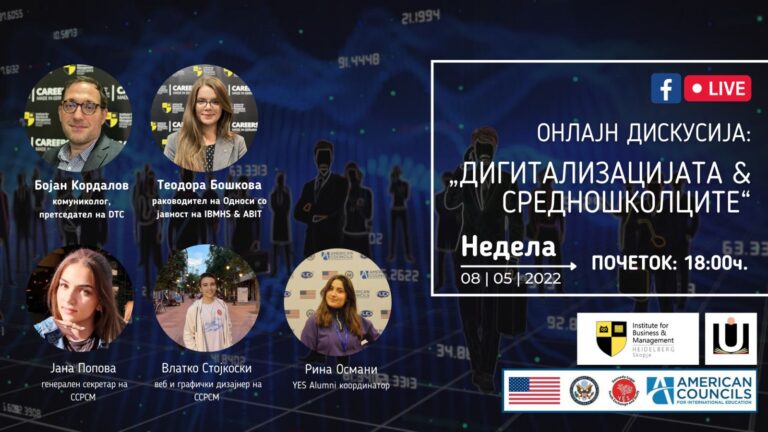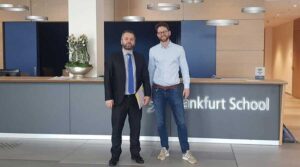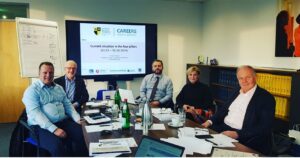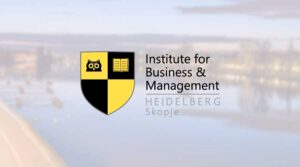Continuous research and monitoring of high school students’ habits and needs, inclusive and more efficient digital solutions – are part of the conclusions of the second series of events on the topic: “Digital transformation of education”, now with a focus on secondary education or “Digitalization and high school students”, organized by the Digital Transformation Council (DTC) at the Heidelberg Institute, the North Macedonian High School Students Association, and the American Councils for International Education (YES Alumni Program).
“Why digitalization? Because we all have the benefit. It gives us more time, more opportunities, and more freedom – it simply allows us to control our own time. That is why Digital Transformation Council at the Heidelberg Institute, which recognized what is happening in the Western Balkans, recognized both the shortcomings and the opportunities, following the German and other Western European models. Together, we are working on the digital transformation to be sustainable and for the benefit of all citizens,” said communicologist Bojan Kordalov, who is chairman of the Digital Transformation Council.
The Union of High School Students of the Republic of North Macedonia – UNSHM is the only national representative body of high school students in the country. The Union unites high school students of all ethnicities and religions, contributes to improving the quality of education and encourages high school students to contribute to their community through their active participation in the decision-making process.
“When we encountered the coronavirus crisis, the first solution was the full online teaching, where the general attitude of the UNSHM was combined teaching (a week at home, a week at school). The same was not realized due to the covid protocols, which led us to think that full digitalization, attending classes and learning from home, do not correspond to our needs and practices because students face difficulties in social development. However, combining and incorporating digital tools in the classroom is a positive process of digitalization, which facilitates and accelerates the educational process.” – said Vlatko Stojkosi, representative of the UNSHM.
At a previous debate between DTC and the Forum for Educational Change, a recent survey by DTC, IDUEP and FECH was presented, which found that 70 percent of students from the Open Balkans countries (Albania, N. Macedonia, Serbia) prefer a model of classroom learning or a combined model.
To the question: “What are the effects of digitalization in secondary education?”, The Secretary-General of the UNSHM, Jana Popova, added: “We all know that the world is moving forward and that digitalization in secondary schools would come sometime. We expected this to happen step by step, while with the advent of the coronavirus we made a big leap. The biggest resistance of the high school students in our country was in the complete digitalization, which resulted in desocialization and closing of schools for a very long period of time.”
On the other hand, the representative of the American Councils for International Education, Rina Osmani, gave a brief overview of the YES program for youth exchange and education, sponsored by the US State Department, in order to provide scholarships for high school students (15-17 years) who will spend one academic year in the United States. The program is vital for communication between people in the United States and partner countries interested in mutual promotion, understanding and respect.
“It’s important to note the security of the online space and the precise guidelines for using digital tools. With the advent of the coronavirus, there was a complete digitalization of processes in the American Councils, as well as a program of virtual cultural and educational exchange. We are following the current situation and adapting to it, with a great deal of attention and caution, pointing out the negative effects of fast digital processes such as information overload among which we encounter ‘fake news’ and the fight against it.”
Namely, the goal of establishing the Western Balkans Digital Transformation Council at the Heidelberg Institute is to unite the civil and private sectors, as well as the academic community, to support the efforts for the successful and sustainable digital transformation of public institutions and governments in the Western Balkans. DTC follows the international experiences (German and Western in general) in their successful models of digital transformation and draws positive practices in order to create a successful Macedonian and a model for sustainable digitalization of interest to all citizens of the Western Balkans region.

At the end of the online discussion, an invitation was sent to the representatives of the UNSHM and the YES program for their membership in the Council, which was accepted by them. Announced was the signing of a Memorandum of Understanding between the Digital Transformation Council at the Heidelberg Institute and the Union of High School Students of the Republic of North Macedonia, as well as the American Councils for International Education (YES alumni program) and new joint activities and events are planned, aimed at sustainable and inclusive digitalization in our country and our education.
“I will use this opportunity to invite everyone who wants to join us, to contact us, to be part of the huge family, the huge team of people who are already working on this topic, and I am especially glad that today we connected it with the high school movement and with the reforms in education.” – concluded the president of DTC, Kordalov.





